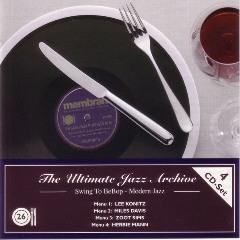The Ultimate Jazz Archive Vol.104 – Herbie Mann [1954-1956] [2005]
The Ultimate Jazz Archive Vol.104 – Herbie Mann [1954-1956] [2005]

01.Between The Devil And The Deep Blue Sea 02.Things We Did Last Summer 03.After Work 04.Chicken Littler 05.Deep Night 06.Cuban Love Song 07.Moon Dreams 08.Scuffles 09.Purple Grotto 10.A Spring Morning 11.My Little Suede Shoes 12.Autumn Nocturne 13.Why DoI Love You 14.It Might As Well Be Spring 15.Woodchuck 16.Love Is A Simple Thing
Herbie Mann played a wide variety of music throughout his career. He became quite popular in the 1960s, but in the '70s became so immersed in pop and various types of world music that he seemed lost to jazz. However, Mann never lost his ability to improvise creatively as his later recordings attest.
Herbie Mann began on clarinet when he was nine but was soon also playing flute and tenor. After serving in the Army, he was with Mat Mathews' Quintet (1953-1954) and then started working and recording as a leader. During 1954-1958 Mann stuck mostly to playing bop, sometimes collaborating with such players as Phil Woods, Buddy Collette, Sam Most, Bobby Jaspar, and Charlie Rouse. He doubled on cool-toned tenor and was one of the few jazz musicians in the '50s who recorded on bass clarinet; he also recorded a full album in 1957 (for Savoy) of unaccompanied flute.
After spending time playing and writing music for television, Mann formed his Afro-Jazz Sextet, in 1959, a group using several percussionists, vibes (either Johnny Rae, Hagood Hardy, or Dave Pike) and the leader's flute. He toured Africa (1960) and Brazil (1961), had a hit with "Comin' Home Baby," and recorded with Bill Evans. The most popular jazz flutist during the era, Mann explored bossa nova (even recording in Brazil in 1962), incorporated music from many cultures (plus current pop tunes) into his repertoire, and had among his sidemen such top young musicians as Willie Bobo, Chick Corea (1965), Attila Zoller, and Roy Ayers; at the 1972 Newport Festival his sextet included David Newman and Sonny Sharrock. By then Mann had been a producer at Embroyo (a subsidiary of Atlantic) for three years and was frequently stretching his music outside of jazz. As the '70s advanced, Mann became much more involved in rock, pop, reggae, and even disco. After leaving Atlantic at the end of the '70s, Mann had his own label for awhile and gradually came back to jazz. He recorded for Chesky, made a record with Dave Valentin, and in the '90s founded the Kokopelli label on which before breaking away in 1996, he was free to pursue his wide range of musical interests. Through the years, he recorded as a leader for Bethlehem, Prestige, Epic, Riverside, Savoy, Mode, New Jazz, Chesky, Kokopelli, and most significantly Atlantic. He passed away on July 1, 2003, following an extended battle with prostate cancer. His last record was 2004's posthumously released Beyond Brooklyn for Telarc. ---Scott Yanow, Rovi
Swoje umiejętności rozwijał w czasie służby wojskowej, a po wyjściu z wojska pracował w studiach filmowych i telewizyjnych jako wykonawca i kompozytor. Pod koniec lat 50. pojawiał się w małych zespołach jazzowych, m.in. z własnym sekstetem Afro-Jazz. Na początku lat 60. zainteresowania Manna muzyką brazylijską doprowadziły do szeregu dobrze sprzedających się nagrań (zwłaszcza “Coming Home Baby”). Chociaż muzycznie i stylistycznie Mann jest entuzjastą bopu (pod koniec lat 60. nagrywał m.in. z Billem Evansem), to pod koniec lat 60. włączył on do swej palety wykonawczej i kompozytorski elementy muzyki etnicznej. Na początku lat 70.Zaczął interesować się także jazz rockiem i stał się jednym z orędowników fusion. Wszechstronność muzycznych zainteresowań oraz inspiracji Manna powoduje, że trudno go stylistycznie klasyfikować: z równym entuzjazmem podchodzi do modern jazzu, jak i disco-popu (jego wersja “Hi-Jack” była w 1975 r. wielkim przebojem w USA). Może właśnie dlatego stał się jednym z popularniejszych jazzowych flecistów. ---muzyka.onet.pl
download: uploaded anonfiles mega gett 4shared mixturecloud yandex mediafire ziddu








